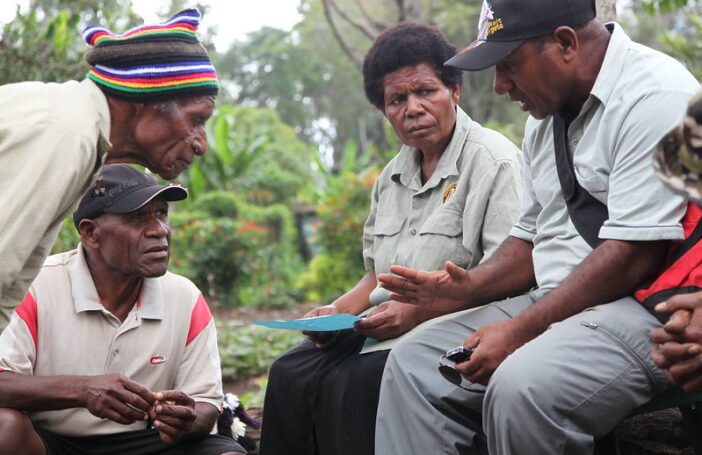Australian aid stories
Last week we launched Australian Aid Stories. Our aim is to put together a body of stories on aid activities that have Australian links and that, according to members of our readership group, are for some reason notable. What has and hasn’t worked in Australian aid should influence thinking about what should be done now and in the future, but too often the innovations and achievements of Australian aid, as well as the failures, vanish without a trace.
Our approach to collecting stories is simple. You can use the comment box at the bottom of this post to provide an initial sketch of your stories, or nominate activities whose stories deserve to be told—ideally with hints as to how we might find out more about them. Or just send us an email (whether with your germ of an idea or a fully fleshed-out account) to devpolicy@anu.edu.au.
New thinking on trade
Trade-development linkages have featured prominently in the blog in the last two weeks. Philippa Dee argued that, not just the Trans-Pacific Partnership negotiations, but the trade liberalisation agenda as a whole (including the WTO negotiations ) is now being held hostage to the attempt of the US to strengthen intellectual property rights through both bilateral and multilateral trade agreements. Philippa calls this anti-development , since it may leave developing countries worse off.
Wesley Morgan summarised his recent APPS working paper on how to strengthen smallholder agriculture, arguing it is not just a matter of aid but of reducing quarantine barriers. Wesley highlights the decade-long and still continuing ban on ginger imports to back his case that “there is little doubt that Australian farmers have sought to maintain trade restrictions to keep out more price-competitive Pacific produce.”
Meanwhile Joel Negin has provided a two part series, first explaining and then critiquing Aid for Trade.
Global and Pacific risk
Join us on March 6 for a public seminar with the authors of two recent World Bank reports on risk: the most recent World Development Report; and on a companion piece on risk and hardship in the Pacific.
Infrastructure reform
The annual Crawford Asia and Pacific Policy Society conference is on March 11 and 12. Devpolicy is organizing a session on the morning of March 12 on infrastructure reform in the Pacific. The speakers include the Chief Economist of the Vanuatu Regulatory Authority (on the political economy of regulation); the head of the Pacific Regional Infrastructure Facility on road maintenance in Africa and the Pacific; and ADB Principal Economist, Dr Shikha Jha, on Asia’s energy subsidies and power sector reform. The new SPC Director General will be opening the conference on March 12. Register here for this conference.
Devpolicy submissions
We provided two submissions to government inquiries last month. The first was to the Senate Inquiry into Australia’s overseas aid and development assistance program. You can read our full submission here [pdf], and a blog summary here. The second was in response to DFAT’s call for submissions on establishing performance benchmarks for the aid program. You can read our full submission here [pdf], and an in brief summary here.
Devpolicy people news
We have had a burst of activity on the PNG PEPE (Promoting Effective Public Expenditure) Project of late. Nicholas Wintle has been working with us for the last couple of months before heading back to PNG an ODI Fellow in Treasury (he had been working with PNG SDP). Ruth Tay has joined the PEPE project as a part-time Research Officer. Win Nicholas worked with the PEPE team as a Research Officer over the summer. Andrew Mako, from our project partner NRI, visited for a week in February. And Ron Sofe is working on the project as part of the Prime Minister’s Pacific Program. Welcome and thanks to all.
We also welcomed back Tess Newton Cain and Richard Curtain, who joined us as Visiting Fellows in February around the time of the AAIDP Workshop.
Finally, we bid farewell to Kerri Elgar, who joined us in the middle of 2013 as a Visiting Fellow working on aid and private sector partnership issues.
2014 AAIDP Workshop papers and presentations
All of the powerpoint presentations and abstracts, along with papers received so far, from the 2014 Australasian Aid and International Development Workshop are now available on our website. Podcasts are now also available of all of the keynote presentations and you can see the video of Roger Riddell’s keynote address here and Foreign Minister Bishop’s here.
Devpolicy walks in her shoes
This year a team from Devpolicy will be taking part in CARE Australia’s fundraising drive ‘walk in her shoes’. You can support our team here.
Upcoming events
Risk and hardship in the Pacific and worldwide
9am 6 March 2014
ODE evaluations: volunteers and aid quality
10am – 1pm 21 March 2014
2014 PNG and Pacific Update
The PNG Update will be at the University of PNG in Port Moresby June 12-13 and the Pacific Update will here at the ANU on June 16-17. We have a call for papers out for the PNG Update. And registrations for the Pacific Update are now open. More details on both here.
2014 PNG Budget Forum
The next PNG Budget Forum will be on Thursday April 10th at the National Research Institute in Port Moresby. The Forum will analyse the 2014 budget, and also release the next round of analysis from the PEPE survey. More details coming soon.
Blog highlights
Stephen Howes reviews Julie Bishop’s ANU aid speech.
Ian Anderson explains why NCDs will bankrupt Pacific governments.
Terence Wood has a go at development critics.
Benjamin Day argues that the DAC has a future, as a lobbyist.
Blog summary
You can find a list of all posts since our last newsletter on 17 February in the list below.
Australian aid
Understanding aid for trade part two: a critique by Joel Negin.
Understanding aid for trade part one: a dummy’s guide by Joel Negin.
Australian aid stories: give us your ripping yarns by Robin Davies.
Five things to like about the Foreign Minister’s aid speech; and two concerns by Stephen Howes.
Eyes front: Devpolicy’s submission to the Senate inquiry into overseas aid by Robin Davies and Stephen Howes.
Pacific and PNG
Diabetes and high blood pressure putting unsustainable pressure on government pharmaceutical and health budget in the Pacific by Ian Anderson.
Aid-for-trade should support the Pacific’s ‘hidden strength’: smallholder agriculture by Wesley Morgan.
Global development policy
Development is unquestionably good, but it also needs good questions by Terence Wood.
Trade held hostage to IP — it’s anti-development by Philippa Dee
From arbiter to advocate: What the DAC’s 2013 expansion tells us about its future (Part 2) by Benjamin Day
In brief
Survey: Who are the aid workers and what are they really doing?
The baby and the bathwater: Devpolicy’s submission on performance benchmarks for aid
Expanding the conversation: public engagement during the Pacific Plan review
Senate submissions reveal a unified aid community
The world’s best refugee camp?
Upcoming event: Lucy Perry, CEO of Hamlin Fistula Ethiopia
Back to Downer Mark I with the aid objective
Sensible cuts: no more aid for Australian political parties or Caribbean edifices




